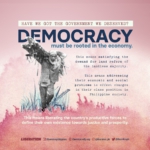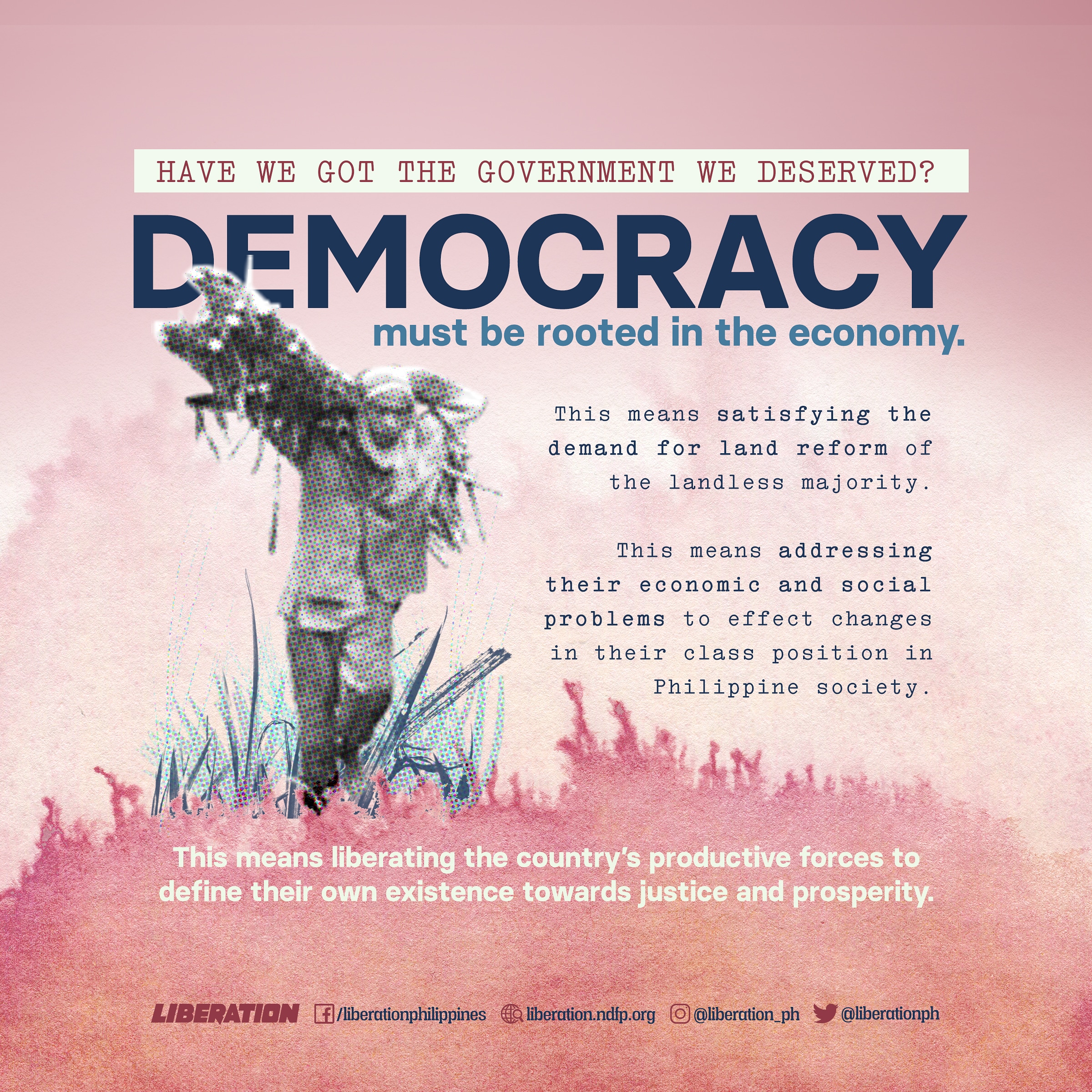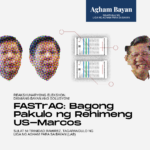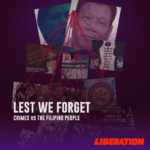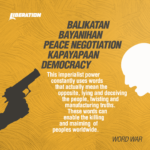FASTrAC: Bagong Pakulo ng Rehimeng US Marcos
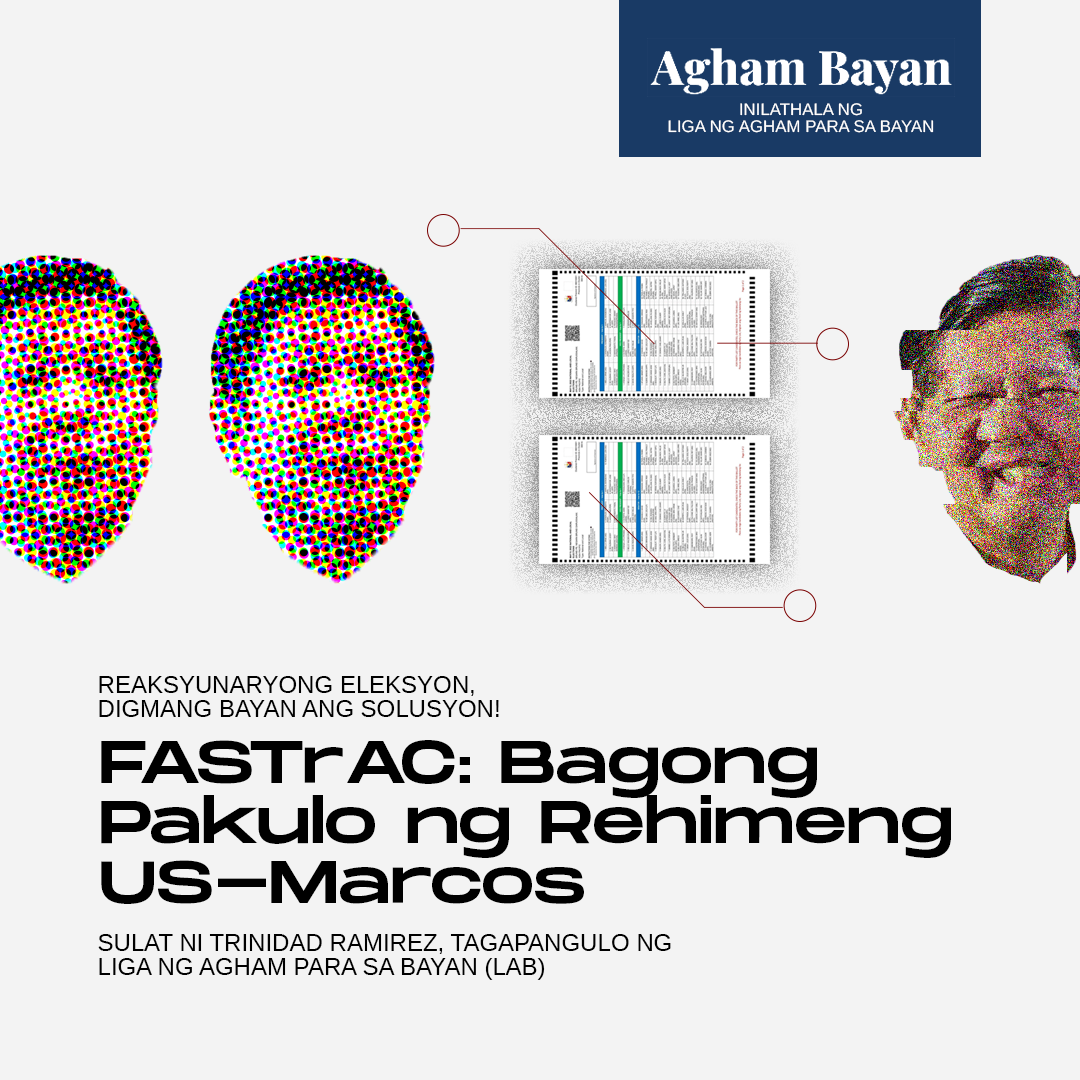
May bagong pakulo na naman ang Commission on Elections (COMELEC) para sa darating na reaksyunaryong eleksyon sa Mayo 2025—ang FASTrAC o Full Automation System with Transparency Audit/Count. Tiyak na isa ito sa mga pamamaraan na gagamitin ng rehimeng US-Marcos para sa pandaraya sa 2025 Pambansang Halalan.
Ang FASTrAC ang bagong mukha ng Automated Election System (AES) sa bansa. Ipinasa ang Republic Act (RA) No. 8436 o “AES Law” noong 1997, at inamyendahan noong 2007. Ginamit ang AES noong Pambansang Eleksyong 2010. Ang Pilipinas ang unang bansa sa Timog-Silangang Asya na gumamit ng ganitong sistema ng eleksyon.
Itinatakda ng AES na ang botohan sa Pilipinas ay gagawing mabilis sa pamamagitan ng paggamit ng elektronikong teknolohiya na gumagamit ng mga makina para tumanggap, magbilang ng mga boto, at magpadala ng resulta ng eleksyon gamit ang internet. Pinayagan ng batas ang mga pribado at dayuhang korporasyon na makialam at kontrolin ang eleksyon sa Pilipinas. Tinutulan ito ng mamamayan dahil alam nilang mas titindi pa ang pandaraya sa eleksyon sa paggamit ng mga teknolohiya at makinang kontrolado ng dayuhan at pribadong korporasyon.
Matagal nang pangarap ng mamamayang Pilipino ang isang malaya, malinis, mapayapa, at demokratikong eleksyon—para pumili ng kakatawan sa kanila at sa kanilang interes o kaya’y itakwil ang mga nakaupong opisyales na di naman nagsilbi sa kanilang mga pangangailangan.
Pero dahil ang eleksyon sa isang mala-kolonyal at mala-pyudal na Pilipinas ay nananatiling isang larong kontrolado ng mga imperyalista, malalaking burgesya-kumprador, panginoong maylupa at burukrata kapilista, hindi mangyayari ang kagustuhang ito ng mamamayan.
AES Law paglabag sa soberanya
Sa AES Law, mas pinahigpit ng imperyalistang Estados Unidos (US) ang hawak nito sa reaksyunaryong eleksyon sa Pilipinas. Mula nang ipinatupad ang automation sa eleksyon, lalong tumindi ang kontrol ng mga dayuhan at pribadong korporasyon. Ipinapaubaya sa kanila ang pagsuplay, paggamit, at pamamahala ng kinakailangang teknolohiya at makina hanggang sa paglalabas ng resulta ng halalan.
Sa ganitong disenyo, natitiyak ng imperyalistang Estados Unidos na isa sa kanyang mga kabayo at tuta mula sa mga lokal na naghaharing uri ang mananalo sa pambansang eleksyon, isang direktang pakikialam sa soberanya ng Pilipinas.
Sa darating na 2025 Pambansang Halalan, ang Miru Systems Co Ltd. ang dayuhang kumpanyang napili ng Rehimeng US-Marcos Jr na magsuplay ng gagamiting teknolohiya at makina. Binigyan ng COMELEC ng halos Php18-bilyong kontrata ang Miru. Bukod dito nagbigay pa ito ng karagdagang Php 1.4 bilyong kontrata sa kumpanyang i-One Resources para naman sa electronic transmission ng resulta ng halalan sa mga sentralisadong server. Pinagmamalaki ng COMELEC na ginagamit ng i-One Resources ang mga teknolohiyang katulad ng hawak ng US Central Intelligence Agency at ng mga institusyong militar ng US.
Ang Miru ay isang South Korean na kumpanya na kakuntsaba ng imperyalistang Estados Unidos. Noong 2018, ang Miru ang pinahintulutan ng US na mamamahala sa pambansang halalan sa Iraq, na sinakop ng US noong 2003. Pumalpak ang halos 70% ng mga makina ng Miru at nagkaroon ng mga glitch at technical failure sa panahon ng eleksyon. Naging malaking kontrobersya ito, nawalan ng tiwala ang mamamayan ng Iraq at nagtulak sa kanila sa paggamit muli ng moda ng halalan mula AES pabalik sa dating pen-and-paper na pamamaraan. Gayundin, sangkot sa mga kaso ng korupsyon at pandaraya ang Miru sa mga halalan sa Democratic Republic of Congo at Argentina, na nagdulot ng malawakang kawalan ng tiwala sa Miru at sa integridad ng halalan sa mga bansang ito.
Korapsyon kakambal ng pandaraya
Bago ang kontrata ng Miru, ang Amerikanong kumpanya na Smartmatic Corp. ang unang nakakuha ng kontrata sa awtomatikong sistema ng eleksyon sa Pilipinas. Mula 2004, maraming mga bansa ang gumamit ng mga makina at teknolohiya ng Smartmatic sa kanilang halalan.
Sa Pilipinas, mula 2010 hanggang 2022, lagpas sa Php 25 bilyon ang nakuha ng Smartmatic sa kabila nang palpak na serbisyo at dayaan para paboran ang mga rehimeng tumangkilik sa nasabing kumpanya.
Noong 2023, idinemanda sa korte sa Estados Unidos ang matataas na opisyales ng Smartmatic at ang dating COMELEC Commisioner Andres Bautista dahil sa daan-daang milyong pisong suhol para matiyak ang kontrata nito sa eleksyon. Kailan lamang, sumingaw naman ang alegasyong bilyon-bilyong pisong suhulan ang naganap sa pagitan ng Miru at si George Garcia, chairperson ng COMELEC para paboran ang Miru. Tumanggap raw si Garcia ng pera na naka-deposito sa offshore accounts.
Mas madayang eleksyon
Sa AES, ang mga elektronikong makina ang tumatanggap ng boto ng mga botante at naglalabas ng resulta. Ang mga makinang ito rin ang nagpapadala ng resulta mula sa bawat presinto papunta sa sentralisadong server gamit ang internet.
Dahil pag-aari at kontrolado ng mga korporasyon ang mga teknolohiya at makina, sila lamang ang nakakaalam elektronikong disenyo at programa nito. Walang katiyakan na ang inilalabas na bilang ng boto at ang pinapadalang resulta ng eleksyon ay tama at makatotohanan.
Naging mas talamak at mabilis ang dayaan sa eleksyon mula noong ipatupad ang AES. Noong Pambansang Halalang 2013 ipinakita ni Prof. Alex Muga ng Center for People Empowerment in Governance (CENPEG) ang padron na 60:30:10 sa resulta ng Senatorial election. Ibig sabihin, ang hatian ng boto para sa mga kandidato ng administrasyon ni Benigno Aquino III at ng oposisyon ay umuulit sa isang tiyak na proporsyon: 60 porsyento para sa mga kandidato ng administrasyon, 30 porsyento para sa oposisyon, at 10 porsyento para sa iba pang kandidato. Napansin ang ganitong regular na padron sa resulta ng eleksyon sa maraming bahagi ng bansa.
Noong 2022, naganap ang pinamabilis na dayaan sa eleksyon sa Pilipinas. Sa loob lamang ng isang oras lumabas na agad ang di kapani-paniwalang resulta ng pagkapanalo ni Ferdinand Marcos Jr at pagkatalo ni Leni Robredo. Ibinunyag ng dating secretary ng Department of Information and Communication Technology (DICT) Brigadier General Eliseo Rio Jr. na malaking bilang ng boto ang “nabilang” na sa maraming lugar kahit hindi pa tapos ang botohan sa mga presinto. Libu-libo rin ang naiulat na hindi gumaganang vote-counting machine sa mismong araw ng halalan kaya malaking bilang ng mga botante ang disenfranchised. Naghapag ng electoral protest ang grupo ni Gen. Rio, pero hanggang ngayon hindi pa rin ito nireresolba ng COMELEC.
Sabi ng COMELEC, magiging mas mabilis ang resulta ng eleksyon ngayon dahil sa FASTrAC—na mas modernong gamit ng Miru System at ng i-One Resources. Pero gaya nang pagpapatakbo ng Smartmatic sa mga nakaraan eleksyon, ganun pa rin ang disenyo at teknolohiya ng pandaraya ang gamit ng Miru at ng i-One Resource. Nananatili ang mga panganib at bulnerabilidad sa manipulasyon ng bilang ng boto at mga glitch sa transmisyon ng bawat presinto sa sentralisadong server.
Mga tradisyunal na pandaraya
Nananatiling sangkap sa pagpapanalo sa reaksyunaryong eleksyon ang mga dati nang pamamaraan ng pandaraya—vote-buying, paggamit ng flying voters, pagwaldas ng pondo ng gobyerno ng mga nakaupong opisyales para sa kanilang kampanya, at terror tactics tulad ng pananakot at paggamit ng mga armadong grupo, pulis at militar para kontrolin o impluwensyahan ang mga botante at resulta ng eleksyon.
Karaniwang nakalalamang sa pandaraya ang mga nasa poder dahil nagagamit nila ang pondo at institusyon ng gobyerno tulad ng media, militar, pulis, korte, at mismong COMELEC. Sa kasalukuyan, ang rehimeng US-Marcos na nasa poder ang pangunahing mandaraya para manatili sa poder at kontrol sa gobyerno.
Disimpormasyon isang maruming taktika
Ang pagkakalat ng disimpormasyon sa social media ang isa sa mga bagong pamamaraan ng mga reaksyunaryong pulitiko at kandidato para lokohin ang masa at ibenta ang mga kasinungalingan. Ginagamit nila ito para mga popular, ikalat ang kanilang pekeng imahe, at paniwalain ang masa na demokratiko, pantay, at malinis ang eleksyon sa Pilipinas.
Noong 2017 masinsin at malaganap na ginamit ito ng pangakating Marcos-Duterte para manalo sa eleksyon. Pinalaganap nilang mahusay ang pamamahala ng pasistang si Rodrigo Duterte. Sa bahagi ng mga Marcos, ginamit nila ang social media at troll army at influencers para baluktutin ang kasaysayan: walang paglabag sa karapatang pantao noong panahon ng martial law, walang korupsyon, maunlad at “golden era” ito sa kasaysayan ng Pilipinas, may makukuhang Tallano gold, magiging 20 pesos ang bigas, atbp.
Ginagamit rin ang pekeng survey para lituhin at impluwensyahan ang mga botante para ihalal sila, o kaya’y ikondisyon ang pampublikong opinyon kung sino ang nagunguna at posibleng manalong mga kandidato. Mula 2021 hanggang bago maghalalan noong 2022, kahina-hinalang kadalasang nakapako sa higit 50-60 porsyento ang pabor daw sa tambalang Marcos-Duterte.
Eleksyon sa rebolusyunaryong kilusan
Kabaligtaran ng reaksyunaryong eleksyon ang nangyayari sa mga lugar na may mga organo ng kapangyarihang pampulitika (OKP) na itinatayo ng mamamayan sa gitna ng rebolusyon. Ang OKP ay ekspresyon ng organisadong lakas ng rebolusyonaryong mamamayan para pakilusin ang buong sambayanan at ipagtagumpay ang rebolusyon. Sa kasalukuyan, hakbang-hakbang itong itinatayo sa kanayunan. Dito nagmumula ang demokratikong kapangyarihan ng mamamayan para sa kanilang interes at mithiin—lupa, edukasyon, pang-kalusugan, atbp.
Isa sa mga pangunahing tungkulin ng OKP ang tuloy-tuloy na pagsulong ng Demokratikong Rebolusyong Bayan (DRB) laban sa imperyalistang dominasyon ng US at lokal na naghaharing uri, ipagtagumpay ang pambansa-demokratikong rebolusyon hanggang sa maitatag ang Pambansang Demokratikong Republika ng Pilipinas.
May iba’t-ibang porma at antas sa kasalukuyan ang mga OKP batay sa lakas at lawak ng rebolusyonaryong kapangyarihan. Karaniwan itong nasa antas baryo (o mga KRB, komiteng rebolusyonaryo ng baryo) tungo sa munisipyo o distrito hanggang antas probinsya.
Ang eleksyon sa mga OKP, halimbawa sa mga KRB, tinitiyak ang patakarang “tatlong sangkatlo” o “3/3”. Ibig sabihin, sa loob ng komiteng rebolusyonaryo ay may karampatang representasyon ang Partido Komunista ng Pilipinas, mga ganap na samahang masa gaya ng Pambansang Kalipunan ng Magsasaka (PKM), Malayang Kilusan ng Bagong Kababaihan (MAKIBAKA) at Kabataang Makabayan (KM), at ang mga panggitnang pwersa.
Mapayapa ang eleksyon sa erya ng OKP—walang gumagamit ng dahas, pananakot at panunuhol—na karaniwang kalakaran sa reaksyunaryong eleksyon.
Makisangkot sa reaksyunaryong eleksyon, palakasin ang rebolusyon
Gaya nang mga nakaraang reaksyunaryong eleksyon, malinaw na ang layunin ng eleksyon sa ilalim ng Rehimeng-US Marcos Jr ay para panatilihan ang malakoloynal at malapyudal na kaayusan sa Pilipinas.
Hindi naiiba ang 2025 Pambansang Halalan sa mga nakalipas na eleksyon—na ito ay tunggalian sa pagitan ng mga paksyon ng naghaharing uri para sa kapangyarihan. Sa 2025, ang pangunahing manlalaro ay ang magkaribal na tuta ng imperyalismong US-Marcos Jr at pangkating Duterte. Sumasawsaw din dito ang mga reserbang kabayo ng US tulad ng Partido Liberal at mga petiburgesyang nagpapanggap na partidong kaliwa tulad ng Akbayan.
Malinaw na lamang ang pangkating Marcos. At dahil nasa pwesto, gagamitin nila ang lahat ng kasangkapang ng pandaraya, tulad ng FASTrAC/AES at pananakot para makalamang sa isa’t-isa. Sino man ang magwagi at makaupo sa kanila, tiyak na papanatilihin lang nito ang kalakaran ng paggamit sa gobyerno para mangurakot, apihin at pagsamantalahan ang mamamayan.
Gayumpaman, pagkakataon ang darating na eleksyon para patampukin ang programa at adhikain ng demokratikong rebolusyong bayan, ibayong ipanawagan at kumilos para sa mga karaingan at kahilingan ng mamamayan, mag-organisa, magpanalo ng mga progresibong kandidato at partido bilang ambag sa pagpapalakas ng rebolusyonaryong kilusan. Dahil sa ilalim ng mala-kolonyal at mala-pyudal na kaayusan, rebolusyon lang ang tangi at tunay na solusyon para makamit ang kalayaan at tunay na demokrasya. ###



